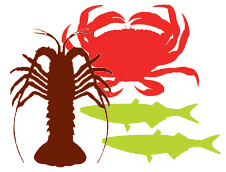
The California Department of Public Health (CDPH) coordinates a routine monitoring program along the California coast to sample mussels and other shellfish like clams and scallops for the presence of Paralytic Shellfish Poisoning (PSP) and domoic acid toxins. Commercial shellfish harvesters are also required to provide weekly shellfish samples to CDPH for PSP toxin assay and domoic acid analysis. If toxin levels are high enough, warnings and quarantines are issued to protect the recreational fishing public and shellfish consumers.
CDPH also has a coastwide, monthly seawater monitoring program which detects the naturally occurring, microscopic algae that produce PSP and domoic acid toxins. When toxin levels begin increasing, CDPH may expand its mussel sampling effort to include other seafood species. If toxin levels increase quickly beyond the federal alert level for either toxin, then CDPH may immediately issue a health advisory for all potentially impacted seafood species in the affected region.
This page was established as a source of information for fishermen and the fishing industry. When circumstances arise, CDPH warnings, quarantine information, and health advisories about consuming California's ocean finfish, shellfish and crustaceans will be posted here.
The Office of Environmental Health Hazard Assessment (OEHHA) also issues consumption advisories based on the amount of mercury or other chemical toxins found in finfish, shellfish and crustaceans. Safe eating guidelines to help you to reduce your exposure to chemicals in sport fish—fish that you and your family or friends catch—are also available from OEHHA.